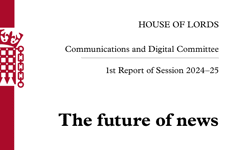As reported on the National Union of Journalists website: In response, the NUJ and the International Federation of Journalists (IFJ), demand Saudi Arabia and its coalition partners (including Bahrain, the United Arab Emirates, Egypt, and Yemen) rescind calls on the Qatari authorities to close down and block Al Jazeera.
Fifty-five journalists from different Gulf states, working at Al Jazeera in Doha, are now under extreme pressure to leave or lose their nationality. The Saudi authorities have given their nationals two weeks to leave or lose their citizenship. Last week the authorities closed Al Jazeera's office in Riyadh and cancelled its operating licence. Jordan has followed suit by closing the Amman office. Members of the Israeli government have also joined the calls to shut the station and its online platforms.
In Saudi Arabia, the commission for tourism and national heritage has joined Bahrain in banning tourist destinations from airing Al Jazeera. Violations of these injunctions face fines up to SR 100,000 (€23,800), closure, revocation of tourism licenses, and even imprisonment. These draconian measures also include fines of up to $2700 for Saudi citizens caught watching Al Jazeera TV.
The crisis is being used as an opportunity to clamp down on reporting and the authorities have blocked other Qatari media and closed independent and critical news websites.
The Egyptian authorities seized equipment at the Cairo office and shut down Al Jazeera in 2013. In Egypt now, more than 100 jobs of Egyptian Journalists Syndicate members are at risk. In the UAE, telecommunication providers, Du and Etisalat, have stopped broadcasting the Qatari-owned sports network Bein Sports. At Al Jazeera and Bein Sports alone 44 Saudi nationals, 13 Bahrainis and one worker from the United Arab Emirates are all under threat.
With hundreds of journalists having settled in Doha as they took up work with Qatari media, many have put down roots and married Qataris. Now those families face being forced apart. The UN human rights chief, Zeid Ra'ad Al Hussein, has warned of creating a humanitarian crisis.
Seamus Dooley, NUJ acting general secretary, said: "We strongly condemn the aggressive manoeuvres emanating from the Saudi authorities and its alliances. Their demands against Al Jazeera are shameful acts to clampdown on freedom of expression and the media. The escalating emergency is having a detrimental impact on people who are in no way to blame for this crisis.
"The authorities need to step back and recognise basic human rights including those of journalists and media workers. Journalists' jobs, homes, and families are all threatened. Many are at risk of becoming undocumented workers without citizenship, and this will put people at risk of acute exploitation. The NUJ is raising these issues with the relevant diplomatic representatives in London and we are pressing them to stop this clampdown immediately."
Anthony Bellanger, IFJ general secretary, said: "We utterly condemn moves to force the closure of Al Jazeera, throw its journalists out of jobs and undermine the freedom to inform, and the right to free speech and free media. Journalists doing their jobs and their families – husbands, wives and children - must not be used as political footballs in this dispute. There is now a grave danger their human rights are being violated. The IFJ will stand in support of every journalist – whether from Qatar or the states imposing the blockade and sanctions – to help defend their right to work, their job and their fundamental human rights."










